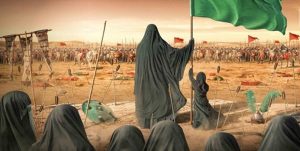The effects of Ashura on free people resonate far beyond the boundaries of Shia Islam or the Middle East, transforming the martyrdom of Imam Hussain (AS) at Karbala in 680 CE into a timeless, universal archetype of resistance against oppression.
The Effects of Ashura on Free People: Karbala
This seminal event, where a small band of truth-seekers faced annihilation by a vast, unjust power, speaks to a fundamental human yearning for justice and dignity.
The effects of Ashura on free people ignite a recognition that the stand of Hussain ibn Ali transcends creed and culture;
it embodies the eternal struggle of the marginalized against the powerful, the voice of conscience against the machinery of tyranny, and the ultimate sacrifice demanded in defense of fundamental rights.
For individuals and movements worldwide confronting injustice, Ashura serves not merely as a historical commemoration,
but as a powerful source of moral inspiration, strategic insight, and spiritual fortification, reminding them that resistance, even in the face of overwhelming odds and certain sacrifice, is the sacred duty of the free.
The cry of “Every day is Ashura, every land is Karbala!” echoes wherever conscience confronts cruelty.
The core narrative of Ashura is stark and potent. Imam Hussain (AS), grandson of the Prophet Muhammad (PBUH), refused to pledge allegiance to Yazid ibn Muawiya, the Umayyad caliph, whose rule was seen as corrupt, illegitimate, and fundamentally opposed to Islamic values.
Knowing the likely consequence, Hussain journeyed towards Kufa, responding to appeals for leadership against tyranny. He was intercepted at Karbala by Yazid’s massive army. you can read more about this topic here.
Denied access to water and facing certain death, Hussain and his small group of male companions, including his half-brother Abbas (AS) and son Ali Akbar (AS), chose to stand their ground. On the 10th of Muharram (Ashura), they were brutally massacred.
The women and children, including Hussain’s sister Zainab (AS) and his surviving son Zain al-Abidin (AS), were taken captive. This narrative crystallizes key universal themes:
-
The Illegitimacy of Tyranny: Hussain’s refusal to legitimize Yazid underscores that power derived from force, corruption, or deviation from justice holds no inherent legitimacy. Authority must be rooted in righteousness.
-
The Duty to Resist Oppression: Passive acceptance of injustice is portrayed as a form of death. Hussain’s stand teaches that confronting oppression, even at great personal cost, is a moral imperative.
-
Sacrifice as Ultimate Witness: Death in defense of truth and justice is framed not as defeat, but as shahadat (martyrdom/witnessing) – the ultimate testimony to one’s beliefs and a catalyst for awakening others.
-
The Victory of Principle Over Power: While Yazid claimed immediate victory, history vindicated Hussain. His moral stand exposed the corruption of the Umayyads and inspired generations of resistance. True victory lies in upholding principles, not merely surviving.
-
The Unbreakable Spirit: The courage of the martyrs and the subsequent fearless defiance of Zainab (AS) in the courts of Kufa and Damascus, eloquently exposing the crimes committed, demonstrate that physical suppression cannot extinguish the spirit of truth.
This archetype provides a powerful framework that the effects of Ashura on free people tap into, regardless of their specific faith or struggle.
Channels of Transmission: How Ashura Reaches Global Audiences
The effects of Ashura on free people are disseminated through various channels, making its message accessible globally:
-
Global Shia Diaspora: Shia communities worldwide commemorate Ashura with passion. Public processions, mourning gatherings (Majalis), and reenactments (Taziyeh) in cities from London to Lagos, Sydney to Toronto, bring the narrative to diverse audiences, sparking curiosity and dialogue.
-
Literature and Scholarship: Translations of historical accounts, theological interpretations, and poetry (like the works of Muhammed Iqbal) exploring Ashura’s universal themes reach academic and activist circles. Non-Muslim scholars of religion, history, and liberation theology engage with Karbala’s significance.
-
Art, Film, and Media: Powerful visual depictions of Karbala in paintings, films, documentaries, and online content convey the emotional and moral weight of the event. Social media amplifies Ashura messages, particularly during Muharram.
-
Discourse of Resistance Movements: Groups within the “Axis of Resistance” (Hezbollah, Palestinian factions, Yemeni Ansar Allah) explicitly invoke Ashura in their rhetoric. Their struggles, covered globally, become living examples linking contemporary resistance to Hussain’s legacy, drawing attention to the narrative’s core message.
-
Interfaith and Justice Dialogues: Ashura is increasingly referenced in interfaith discussions focused on shared values of justice, sacrifice, and standing against oppression. Human rights activists draw parallels between Hussain’s stand and modern struggles for freedom.
Manifestations: Ashura’s Influence on Global Liberation Struggles
The effects of Ashura on free people manifest in diverse ways, inspiring individuals and movements fighting various forms of oppression:
-
Anti-Apartheid Struggle (South Africa): Leaders like Nelson Mandela and Desmond Tutu acknowledged the power of narratives of sacrifice and resistance. While not direct, the ethos of Ashura – sacrificing comfort and security for the sake of justice and human dignity – resonated deeply with the spirit of the anti-apartheid movement. The defiance in the face of overwhelming state brutality mirrored Hussain’s stand. Activists found strength in the idea that moral victory ultimately prevails, even after immense suffering.
-
Indian Independence Movement: Mahatma Gandhi, though Hindu, reportedly studied the Karbala narrative and drew inspiration from Hussain’s non-violent resistance in principle – the willingness to suffer and die for truth without inflicting violence on the oppressor. He reportedly stated, “I learned from Hussain how to achieve victory while being oppressed.” The emphasis on principled defiance against a powerful empire (Britain) found a resonant echo in Karbala.
-
Civil Rights Movement (USA): Figures like Malcolm X, after his Hajj and exposure to broader Islamic thought, spoke powerfully against oppression. The narrative of Hussain – a righteous leader standing against a corrupt system, suffering violence for his principles – resonated with the African American struggle against systemic racism and state violence. The themes of witnessing (shahadat) and unbreakable spirit aligned with the movement’s ethos. Contemporary Black activists sometimes draw explicit parallels between figures like Hussain and victims of police brutality who become symbols of resistance.
-
Resistance Against Military Dictatorships (Latin America): In countries like Chile and Argentina, movements opposing brutal juntas emphasized human dignity, truth, and the courage to resist despite terror. The story of Karbala, particularly the role of Zainab (AS) in speaking truth to power after the massacre, offered a powerful metaphor. The idea that tyranny could kill bodies but not the truth or the spirit of resistance provided solace and fortitude.
-
Pro-Democracy Movements (Myanmar, Hong Kong, Belarus): Activists facing violent crackdowns while demanding basic freedoms often operate with a profound sense of moral conviction against overwhelming state power. The Ashura paradigm – sacrificing safety for a just cause, knowing the personal cost may be high but believing the cause will ultimately prevail – provides deep psychological and moral sustenance. Images and slogans referencing Karbala have occasionally appeared in these contexts.
-
Indigenous Rights Movements Globally: Communities fighting for land rights, cultural survival, and against environmental destruction often frame their struggle as defending their existence against powerful, exploitative forces. Hussain’s stand for his community’s survival and values against an empire resonates deeply. The willingness to endure hardship and sacrifice for future generations mirrors the Karbala spirit. The effects of Ashura on free people within these movements often manifest as a strengthening of resolve and a moral framework for their resistance.
-
Contemporary Anti-War & Anti-Oppression Activism: Global movements protesting wars of aggression, occupation (like Palestine), or corporate exploitation frequently invoke principles of justice, human dignity, and resistance to illegitimate power – principles central to the Ashura narrative. Activists find in Hussain a symbol of unwavering commitment to these ideals.
Core Impacts: How Ashura Empowers the Spirit of Resistance
The effects of Ashura on free people translate into tangible psychological, moral, and strategic impacts:
-
Moral Legitimization of Resistance: Ashura provides a powerful religious and ethical framework that legitimizes resistance against perceived tyranny. It counters narratives that portray opposition as futile, criminal, or extremist. Standing against oppression becomes a sacred duty.
-
Cultivation of Courage and Sacrifice: Hussain’s example transforms the concept of sacrifice from a tragedy into a noble, potent act. It inspires individuals to overcome fear, endure hardship, and be willing to pay a high personal price for their beliefs and community. The effects of Ashura on free people often manifest as extraordinary courage in the face of danger.
-
Strengthening Resilience and Perseverance: The narrative emphasizes that setbacks and suffering, even martyrdom, are not the end. The moral victory of Karbala endured long after the physical defeat. This instills a long-term perspective, fostering resilience and the perseverance needed for protracted struggles.
-
Providing a Model of Principled Action: Hussain’s refusal to compromise his core principles, even for survival, offers a model of integrity. It inspires movements to ground their resistance in clear ethical foundations, resisting the temptation to mirror the oppressor’s tactics in ways that betray their core values.
-
Fostering Hope Against Despair: In the darkest moments of oppression, the Karbala narrative serves as a beacon of hope. It demonstrates that a single act of principled defiance can ignite a fire that outlives the tyrant. It reminds the oppressed that their cause is just and ultimately invincible on a moral plane.
-
Emphasizing the Power of Truth-Telling: Zainab’s (AS) role after Karbala highlights the crucial weapon of speaking truth to power. Her fearless oration exposed the crimes committed and preserved the true narrative. This inspires activists to prioritize documentation, testimony, and communication as vital tools of resistance.
-
Building Solidarity Across Boundaries: The universal themes of Ashura can create bridges between different oppressed groups. Recognizing a shared struggle against various forms of tyranny fosters a sense of global solidarity among free people.
Nuances and Critiques
While profound, the effects of Ashura on free people are complex and subject to interpretation:
-
Non-Violent Interpretation vs. Armed Resistance: The primary interpretation emphasizes Hussain’s principled stand and acceptance of martyrdom without initiating violence. However, the narrative has also been invoked to justify armed resistance. This divergence leads to debate about the most authentic application of the Karbala ethos.
-
Potential for Sectarian Instrumentalization: In some contexts, Ashura commemorations or rhetoric can exacerbate sectarian tensions, potentially alienating potential allies from other faiths or backgrounds who might otherwise resonate with the universal message.
-
Risk of Fatalism: An overemphasis on martyrdom could potentially lead to a fatalistic acceptance of suffering or undervaluing strategies focused on preservation of life and long-term political struggle.
-
Contextual Interpretation: Applying a 7th-century narrative to modern, complex geopolitical situations requires careful interpretation to avoid oversimplification or misapplication.
An Eternal Beacon for the Oppressed
The effects of Ashura on free people confirm the enduring power of Imam Hussain’s stand at Karbala as a universal symbol of resistance.
It transcends its specific historical and religious context to speak a fundamental truth: that the human spirit craves freedom and justice, and that confronting oppression, regardless of the cost, is a defining act of human dignity.
Ashura provides not just solace, but a potent toolkit for the oppressed – moral legitimacy, unyielding courage, resilience in the face of despair, a model of principled action, and the transformative power of truth-telling.
It reminds free people everywhere that tyranny, no matter how powerful, is ultimately transient when confronted by unwavering conscience and sacrifice.
The blood of Hussain (AS) waters the eternal tree of liberty, its shade offering refuge and its fruit nourishing the resolve of all who stand against injustice.
As long as oppression exists, the cry of “Labbaik Ya Hussain” (Here I am, O Hussain!) will echo in the hearts and actions of free people, affirming that the spirit of Karbala lives on in every struggle for human dignity.
The effects of Ashura on free people ensure that Imam Hussain’s sacrifice remains not just a memory, but an ever-present call to action for generations to come.
source: raialkhalij



